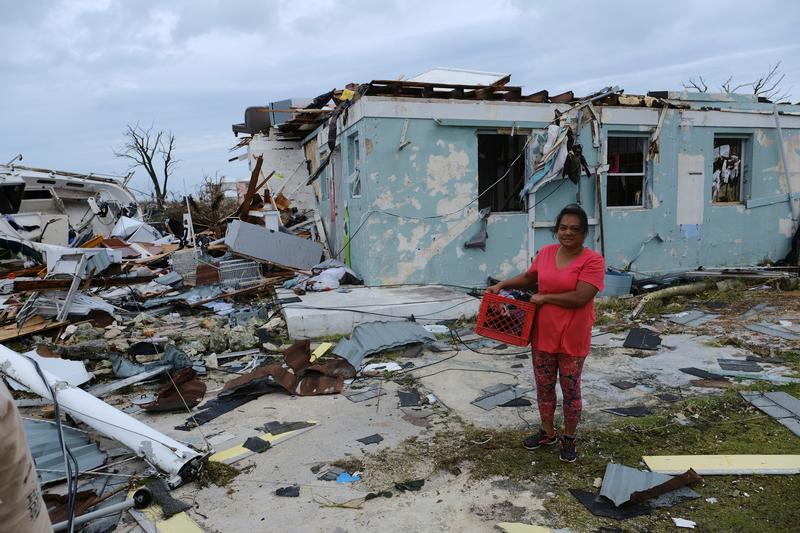Climate journalists are struggling. Newsrooms should develop a mental health strategy to help them cope

A woman poses for a photo near her damaged home in the aftermath of Hurricane Dorian on the Great Abaco island town of Marsh Harbour in September, 2019. Credit: Dante Carrer/Reuters.
It's been four years since Hurricane Dorian ripped across the Caribbean islands, yet some of the images from that storm still haunt me.
As the team from CCN TV6 from Trinidad and Tobago landed in the Abaco islands, in northern Bahamas, we were met with a hot, putrid stench. There were no birds. There were no trees. The stress of working near places of death, infection, and continued conflict was gradually settling in. It was not my first assignment abroad during hurricane season in the Caribbean, but it was the first one for which I felt mentally unprepared.
Journalists are often the first to respond to major weather disasters. Our role is to provide information even when we are working in the most dangerous, upsetting, and hazardous settings. And yet witnessing trauma can impact us long after the incident has ended. When it comes to disasters fueled by climate change, we also face the prospect of covering the same kinds of disasters again and again, wearing down our sense of agency and impact.
We already know frontline journalists face physical risks in the course of doing their jobs, particularly when covering war or conflict. Many newsrooms throughout the world have regular checklists to prepare for and manage the dangers of covering certain hazards and events.
But the same preparedness for mental health, especially for covering climate-linked disasters, is almost unheard of.
It's past time to fix that. Journalists covering climate-related catastrophes should be given mental health checklists that outline what their newsrooms will do before, during, and after a potentially stressful assignment. The industry also needs to prepare support for journalists to recover from mental health issues when they do happen. In general, communicating about mental health, including anxiety and depression, should be part of newsroom culture.
We already know that journalists can suffer psychologically while doing their jobs. Multiple studies have shown that at least 80% of journalists have witnessed a traumatic event, according to the DART Center for Journalism and Trauma; many journalists have experienced not just one but multiple traumatic events.
A 2019 paper on journalists covering Hurricane Harvey, for example, found that 20% of journalists developed storm-related PTSD afterwards, while 40% developed signs of depression.
And yet, it’s often assumed that journalists are only exposed to traumatic events on certain beats—covering deadly crimes or wars, for example.
Unfortunately, mental health is particularly taboo in many newsrooms and parts of the world. At a recent TechCamp Bridgetown for Caribbean journalists in Miami, Florida, we discussed how many news organisations do not provide counselling services following catastrophic weather-related disasters and other traumatic events. Many Caribbean journalists I've spoken with say they keep this trauma to themselves, and attempt to find ways to manage the stress on their own.
Meanwhile, disaster reporting is becoming more common at Caribbean news organisations. This is because climate change is making these events more frequent, and more intense—there are simply more storms, more severe droughts, more disasters.
As my colleagues and I flew over the Bahamas' hurricane-ravaged islands that day, we became quiet. We worked non-stop for three days, reporting on the efforts of emergency response personnel, and filming as individuals were escorted onto boats and flights out of the most disaster-stricken areas.
I can still clearly picture the island where the hurricane’s landfall took place. People sobbed in both French and English while clinging to their family members and whatever possessions they could find. Many individuals stood in the heat looking up at the sky in search of hope. To this day, I still worry that my interview questions caused further harm to the already vulnerable situation that so many individuals were in.
Many journalists are discouraged from getting treatment when they need it because the people they cover are experiencing much greater suffering. They feel guilty for being upset by what they've seen, when they believe someone else has it far worse. This guilt, however, does not lessen the impact of a traumatic event. It just prevents reporters from receiving assistance and makes recovery more difficult.
Upon returning to our island after covering the Hurricane, we were congratulated by peers for our great work. But there was no culture for recovery. Deadlines were fast approaching and more storms were looming. We had no official psychological support in the days that would follow, besides the comfort we found in each other through our brief chats about our experiences. I wore my anguish well and reminded my colleagues to be strong, because the job was not done yet.
Although some in the Caribbean may view the mental health burden on journalists as taboo, it doesn’t need to be this way. There are simple things newsrooms can do to recognise the impact this has on their staff and help them cope.
By creating a mental health checklist, managers can quickly draw on the frameworks they already have for dealing with physical hazards. They can also draw from resources like the DART Center, and can recognise the impact disasters have not just on the frontline reporters and camera crews but also on the video and content editors back in the office who will view distressing footage.
Climate journalists fulfil one of the most crucial roles in civil society: informing the public about how warming temperatures influence their daily lives and threaten their safety. But journalists are also people. We require support and compassion just like anyone else.







